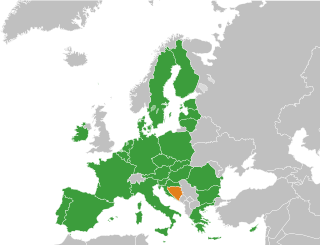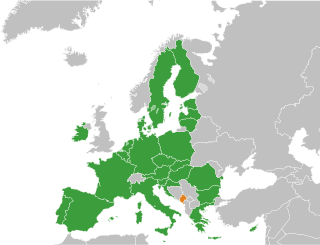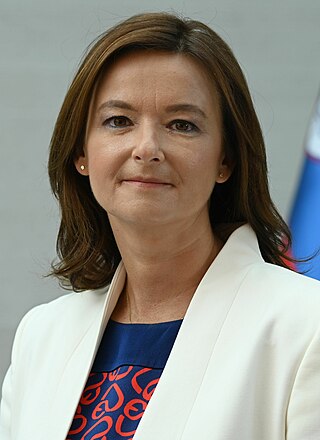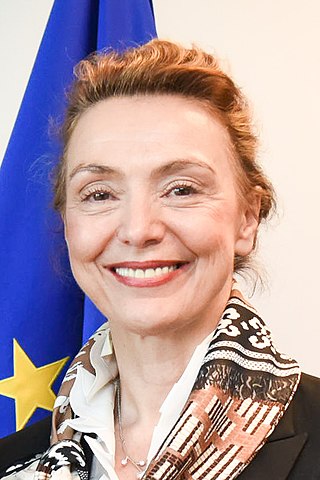
The Community acquis or acquis communautaire,sometimes called the EU acquis and often shortened to acquis,is the accumulated legislation,legal acts and court decisions that constitute the body of European Union law that came into being since 1993. The term is French:acquis meaning "that which has been acquired or obtained",and communautaire meaning "of the community".

The Energy Community,commonly referred to as the Energy Community for South East Europe (ECSEE),is an international organization consisting of the European Union (EU) and a number of non-EU countries. It aims to extend the EU internal energy market to wider Southeast Europe. The members commit to implement relevant EU energy acquis communautaire,to develop an adequate regulatory framework and to liberalize their energy markets in line with the acquis under the founding Treaty.

The Consolidation of the Justice System in Albania (EURALIUS) was an EU funded technical assistance project that sought the strengthening of the Albanian Justice System. The objective of EURALIUS was to strengthen the independence,transparency,efficiency,accountability and public trust in the Albanian justice system in line with the EU Acquis and best practices. EURALIUS was composed of long-term international experts from various EU Member States and of Albanian legal professionals who act as national experts,as well as support staff consisting of project assistants,translators,etc.

Albania is on the current agenda for future enlargement of the European Union (EU). It applied for EU membership on 28 April 2009,and has since June 2014 been an official candidate for accession. The Council of the European Union decided in March 2020 to open accession negotiations with Albania.

The accession of Bosnia and Herzegovina to the European Union (EU) is the stated aim of the present relations between the two entities. Bosnia and Herzegovina has been recognised by the European Union as a "candidate country" for accession since the decision of the European Council in 2022 and is on the current agenda for future enlargement of the EU. Bosnia and Herzegovina takes part in the Stabilisation and Association Process and trade relations are regulated by an Interim Agreement.

Accession of Montenegro to the European Union is on the agenda for future enlargement of the EU.

In general,the law of the European Union is valid in all of the twenty-seven European Union member states. However,occasionally member states negotiate certain opt-outs from legislation or treaties of the European Union,meaning they do not have to participate in certain policy areas. Currently,three states have such opt-outs:Denmark,Ireland and Poland. The United Kingdom had four opt-outs before leaving the Union.
European Union (EU) concepts,acronyms,and jargon are a terminology set that has developed as a form of shorthand,to quickly express a (formal) EU process,an (informal) institutional working practice,or an EU body,function or decision,and which is commonly understood among EU officials or external people who regularly deal with EU institutions.

The accession of North Macedonia to the European Union has been on the current agenda for future enlargement of the EU since 2005,when it became an official candidate for accession. The then Republic of Macedonia submitted its membership application in 2004,thirteen years after its independence from Yugoslavia. It is one of nine current EU candidate countries,together with Albania,Bosnia and Herzegovina,Georgia,Moldova,Montenegro,Serbia,Turkey and Ukraine.

Tanja Fajon is a Slovenian politician,former leader of Social Democrats,part of the Party of European Socialists and former Member of the European Parliament (MEP) from Slovenia. She has been serving as the minister of foreign and european affairs in the government of Prime Minister Robert Golob since 1 June 2022.
The Mechanism for Cooperation and Verification (CVM) was a safeguard measure invoked by the European Commission when a new member or acceding state of the European Union failed to implement commitments undertaken in the context of the accession negotiations in the fields of the Area of freedom,security and justice or internal market policy. The European Commission has decided to not use CVM anymore. Instead,the Commission expects every new member to join the EU without deficiencies that would require special monitoring.

Albania has an embassy in the Hague and the Netherlands has an embassy in Tirana.

Ditmir Bushati is an Albanian politician and diplomat who served as Minister of Foreign Affairs from 2013 to 2019. He previously chaired the Parliamentary Committee for European Integration.

The Ministry of Justice is one of the 12 ministries which comprise the Finnish Government. Headed by the Minister of Justice,it is responsible for maintaining the legal safeguards necessary for the successful operation of democracy and fundamental rights of the inhabitants of Finland.

The Treaties of the European Union are a set of international treaties between the European Union (EU) member states which sets out the EU's constitutional basis. They establish the various EU institutions together with their remit,procedures and objectives. The EU can only act within the competences granted to it through these treaties and amendment to the treaties requires the agreement and ratification of every single signatory.

Poland has been a member state of the European Union since 1 May 2004,with the Treaty of Accession 2003 signed on 16 April 2003 in Athens as the legal basis for Poland's accession to the EU. The actual process of integrating Poland into the EU began with Poland's application for membership in Athens on 8 April 1994,and then the confirmation of the application by all member states in Essen from 9–10 December 1994. Poland's integration into the European Union is a dynamic and continuously ongoing process.

Albania–Germany relations are the bilateral relations between Albania and Germany.

The history of bilateral relations between Albania and Austria dates back to 1912,when Albania declared its independence on 28 November 1912. Albania has an embassy in Vienna. Austria has an embassy in Tirana. As a European Union (EU) member,Austria supports Albania in its euro-integration path. Both countries are members of the Council of Europe and Organization for Security and Co-operation in Europe.

Marija PejčinovićBurić is a Croatian politician of the centre-right Croatian Democratic Union party who served as Minister of Foreign and European Affairs and First Deputy Prime Minister of Croatia from 2017 to 2019. She was the third woman to hold the post of foreign minister,following Kolinda Grabar-Kitarovićand Vesna Pusić. PejčinovićBurićpreviously served as a Member of Parliament during its Sixth Assembly (2008–2011),representing the 6th electoral district.

The 2022 EU–Western Balkans summit was the fourth edition of the European Union–Western Balkans summit held on 6 December 2022 in Tirana,Albania. Hosted by the Albanian Prime Minister,Edi Rama,the summit brought together heads of state and government from the Western Balkan nations,including Bosnia and Herzegovina,Kosovo,Montenegro,North Macedonia,and Serbia,alongside other EU representatives. Amid the setting of the ongoing Russo-Ukrainian War,it underscored the union's commitment to strengthening its political,economic,and security cooperation with the region. Among the central themes of the discussions was the union's support for the region's integration,particularly through the alignment of the Western Balkans with EU standards. The Tirana Declaration,one of the summit's key results,reaffirmed the EU's dedication to the region's EU accession process,while highlighting the demand for political and institutional reforms and democratic principles.


















